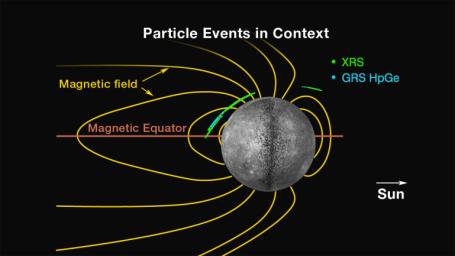
|
Locations of Energetic Electron Events
- Click the image above for a larger view
- Full-Res JPEG (1280 x 720) (77.3 kB)
- Full-Res TIFF (1280 x 720) (2.8 MB)
Caption:
A cross-section of Mercury's magnetosphere (in the noon-midnight plane, i.e., the plane containing the planet-Sun line and Mercury's spin axis) provides context for the energetic electron events observed to date with the MESSENGER XRS and GRS high-purity germanium (HpGe) detectors. The Sun is toward the right; dark yellow lines indicate representative magnetic field lines. Blue and green lines trace the regions along MESSENGER's orbit from April 2 to April 10 during which energetic electrons were detected and MESSENGER's orbit was within ± 5° of the noon-midnight plane. The presence of events on the dayside, their lack in the southern hemisphere, and their frequency of occurrence at middle northern latitudes over all longitudes point to a more complex picture of magnetospheric activity than found at Earth.
Date Presented:
June 16, 2011, at a
NASA press conference
Instrument:
X-Ray Spectrometer (XRS) and Gamma-Ray and Neutron Spectrometer (GRNS)
Background Info:
The MESSENGER spacecraft is the first ever to orbit the planet Mercury, and the spacecraft's seven scientific instruments and radio science investigation are unraveling the history and evolution of the Solar System's innermost planet. Visit the Why Mercury? section of this website to learn more about the key science questions that the MESSENGER mission is addressing.
These images are from MESSENGER, a NASA Discovery mission to conduct the first orbital study of the innermost planet, Mercury. For information regarding the use of images, see the MESSENGER image use policy .
Cataloging Keywords:
| Name | Value | Additional Values |
|---|---|---|
| Target | Mercury | |
| System | ||
| Target Type | Planet | |
| Mission | MESSENGER | |
| Instrument Host | MESSENGER | |
| Host Type | Orbiter | |
| Instrument | X-Ray Spectrometer (XRS) | Gamma Ray and Neutron Spectrometer (GRNS) |
| Detector | ||
| Extra Keywords | Color, Magnetosphere, Radio, Rotation | |
| Acquisition Date | ||
| Release Date | 2011-06-16 | |
| Date in Caption | 2011-06-16 | |
| Image Credit | NASA/Johns Hopkins University Applied Physics Laboratory/Carnegie Institution of Washington | |
| Source | photojournal.jpl.nasa.gov/catalog/PIA14343 | |
| Identifier | PIA14343 | |
